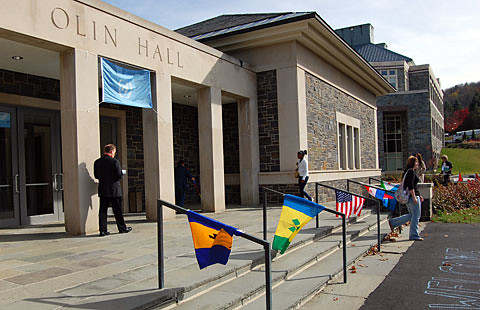 Nearly 100 area high school students attended workshops and lectures at Colgate on Friday as part of a U.N. Day observance organized by the university’s ALANA Cultural Center.
Nearly 100 area high school students attended workshops and lectures at Colgate on Friday as part of a U.N. Day observance organized by the university’s ALANA Cultural Center.
Flags representing the United States and other nations marked several campus venues where sessions were held throughout the day.
The high school students heard professors from Colgate and Utica College talk about topics such as the U.N.’s role in protecting human rights, the Mideast peace process, and economic development and other issues affecting Africa.
About 30 student volunteers from Colgate and Utica College gently encouraged the high schoolers to ask questions and take part in the discussions.
“It was great to see how involved the kids were after the college students helped get the conversations going,” said Thomas Cruz-Soto, director of ALANA.
 |
| Flags from the U.N. and from around the world greeted high school students who gathered at Olin Hall and other campus sites Friday to attend lectures as part of U.N. Day. (Photo by Tim O’Keeffe) |
Students from high schools in Waterville, Hamilton, Whitesboro, Utica, and New Hartford attended, according to Makiko Filler of ALANA, who along with program coordinator Shevorne Martin helped organize the sessions.
The Colgate team worked with John Slater and Sherry Wright, president and vice president respectively of the Upper Mohawk Valley of the United Nations Association.
“I think the day raised the students’ global awareness and exposed them to ideas and topics that many of them had not been exposed to before,” said Wright. “We’re really grateful to Colgate for hosting this event.”
The afternoon keynote speaker was Peter Vogelaar, executive director of the Mohawk Valley Resource Center for Refugees in Utica.
Colgate has long had a relationship with the center, with many students working there through the university’s Center for Outreach, Volunteerism and Education and as part of a service learning project led by geography professor Ellen Kraly.
Vogelaar spoke about the center’s work and how it ties in to the Office of the UN High Commissioner for Refugees.
While there are more than 14 million refugees worldwide, only about 60,000 could be afforded the opportunity to be resettled in the United States this past year, he said.
The United Nations was formally established on Oct. 24, 1945.
Theodore Orlin, the morning’s keynote speaker, said it is time for a new generation of leaders to re-commit to the U.N.’s principles.
“We have to find collective solutions to the problems facing us today,” said Orlin, who is the Clark Professor of Human Right Scholarship and Advocacy at Utica College and the founder and director of the college’s Human Rights Advocacy Program.